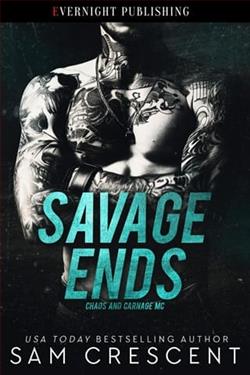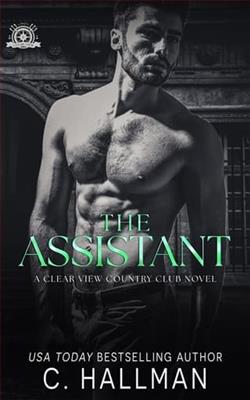Page 80 of Veil of Blood
I nod and stand. “Still does.”
He laughs, a tight sound. “Ferrano?”
I rest a hand on the scooter’s seat and lean in. “Dead name. You want work or war?”
He swallows. “Work.”
I pull a stool over and sit. “Drop it here. I’ll have it running in two hours.” I gesture to my workbench. “Tools are in the back.”
He drops the scooter on its stand and steps back. “Thanks, man. I—I’ll be back.”
He leaves, the door whooshing shut behind him. I slip the stool aside and return to the axle housing. I fit the shaft back in, torque the nut to spec, and wipe my hands again. There’s a faint sound of cars on the street, engines rising and falling like distant waves. The shop door’s open, letting that rush of life in.
I stand and rub my palms, then turn to the bench to grab a fresh rag. I wipe down the chrome calipers, spin the tire to watch concentric circles turn perfectly. No more threats waiting in the gaps. No shadows of last week. Just metal aligning with metal, track setting with track, all parts finding their place.
I press the scooter’s start button. It stutters twice, then kicks to life. The exhaust sputters through patched holes and imperfections, but it runs smoothly. The teenager will have a bike that won’t leave him stranded. That’s enough.
I step into the afternoon sun to watch him throttle down the street. He glances back once, gives me a nod. I raise my hand in a quick salute. He doesn’t smile, but he does lift his hand in return. A connection—a passenger exchanged in a moment of trust.
Back in the shop, I wipe oil from the bench, fold rags into a stack, and hang new parts on labeled hooks. I cross to the shelf by the office door and add the scooter’s ignition key to the keychain with Luca’s charm. A mechanic’s ledger sits next to it; I flip to today’s page and note: “17-year-old scooter—repaired steering + brakes.”
I close the ledger and step outside for a breath. Palm trees bend against a cloudless sky. A breeze carries city noise—horns, engines, voices all mixed into a hum. I lean on the door frame and watch traffic pass. None of it concerns me. My war is over. My road is here.
I glance back at my shop, sign swinging in the wind, tools glinting behind the windows. She might never come back here. But every part I fix, every wheel I turn, builds something that lasts. Each engine that roars out that door is a reminder of what I’ve chosen—a life in motion, in purpose, not in conflict.
I flick the radio dial again. Static spills across the bay, steady and patient.
That’s what peace looks like. One busted engine at a time.
The afternoon has settled into routine. My hands move over the scooter’s carburetor, tightening the mounting bolts one by one, each click echoing in the spacious bay. Light falls through the high windows, illuminating metal surfaces in broad strokes. I grease the throttle linkage, ensure every fitting lines up. Tools hang in their places—socket sets, feeler gauges, torque wrenches—all within reach. The scooter stands on its center post, tank polished, wheels ready. Everything almost finished, everything under control.
I step back and wipe grime from my forearms with a shop towel. The ridges of my muscles shift with the motion, reminders of every fight, every wrench turned in anger or necessity. Three weeks since Chiara drove off. Three weeks since I promised myself no more blood on my hands. This scooter isn’t a car—its engine is light, noises at low registers—but it carries the same engine-flame that used to burn my veins. Now it purrs under my touch.
A sudden screech rips through the quiet, tires skidding on gravel outside. I don’t pause my work. No protective stances, no flash of adrenaline across my face. I let my fingers complete one last turn, then drop the wrench into the tray. My gaze shifts to the rolling service door. A momentary flicker of awareness flares within me. My hand reaches toward the bench where I keep my knife. The tang slides free from its sheath. Its blade is cold metal, honed to a precise edge.
If they’re still coming, let them.
That thought carries years of truth: this shop, these tools, this life—they’re mine. If violence finds me here, I meet it on my ownterms.
The door bursts upward. A man charges inside, pistol drawn. He’s a Ferrano straggler—one of the ones who never believed the boss was dead. His jacket is stained, sleeves torn at the elbows. His face is half-hidden beneath a cowl. He shouts without hesitation:
“Damiani! You think you’re out?”
I don’t raise my voice. I don’t even shift my shoulders. Knife in hand, I take a single step forward. Sunlight from the open door cuts across his barrel. I answer quietly: “No. I know I am.”
He pulls the trigger. The shot slams through the bay, ricocheting off metal surfaces. It misses me by inches and rattles the nearest tool rack. I react with muscle memory: dive behind the workbench, wrench swinging in my free hand. The impact cracks against his knee. He collapses, a howl of pain mixing with the reverberating ricochet.
I spring forward. Knife finds flesh. It sinks deep in a breathless motion, catching tendon and muscle at once. He tries to yank back, but I’m already pressing in, leaving him no room to twist. His ragged breath hitches, blood pouring from the seam I split.
His body loosens on the concrete. I step away and wipe my blade on the rag draped over the door handle. No shout. No announcement. Just the sound of his life draining onto the floor in a spreading pool.
“You should’ve stayed gone,” I say aloud, voice even. Blood seeps beneath my boots. I press one foot against his side and kick the gun away. It skids under a shelving unit, far from his reach.
I take a rag from the bench and fold it over the blade. Once the edge is hidden, I slide the knife back under the bench. My hands aren’t trembling. My breath isn’t ragged. I finish what needs doing.
I bend, grab him under the arms, and drag him through the back door. Concrete gives way to grass and gravel. I dump him by the canal lip. The current whispers just beyond reach. I don’t watch him vanish. I walk back inside.
By the time I flip the back door closed, sweat beads at my temples. I fill a bucket with soapy water and scrub the blood stain from the concrete near the bench. Each stroke lifts a layer of red without question. I rinse the mop, hang it beside the other cleaning tools, and return to the workbench.















